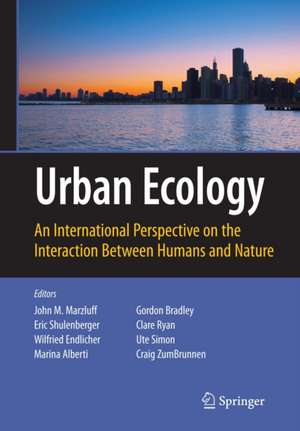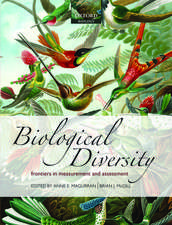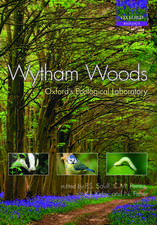Urban Ecology: An International Perspective on the Interaction Between Humans and Nature
Eric Shulenberger Editat de John Marzluff Wilfried Endlicher, marina Alberti, Gordon Bradley, Clare Ryan, Craig ZumBrunnen, Ute Simonen Limba Engleză Hardback – 11 ian 2008
| Toate formatele și edițiile | Preț | Express |
|---|---|---|
| Paperback (1) | 761.59 lei 6-8 săpt. | |
| Springer Us – 23 aug 2016 | 761.59 lei 6-8 săpt. | |
| Hardback (1) | 766.77 lei 6-8 săpt. | |
| Springer Us – 11 ian 2008 | 766.77 lei 6-8 săpt. |
Preț: 766.77 lei
Preț vechi: 935.09 lei
-18% Nou
Puncte Express: 1150
Preț estimativ în valută:
146.72€ • 153.74$ • 121.29£
146.72€ • 153.74$ • 121.29£
Carte tipărită la comandă
Livrare economică 11-25 aprilie
Preluare comenzi: 021 569.72.76
Specificații
ISBN-13: 9780387734118
ISBN-10: 0387734112
Pagini: 807
Ilustrații: XXVI, 808 p.
Dimensiuni: 178 x 254 x 42 mm
Greutate: 1.57 kg
Ediția:2008
Editura: Springer Us
Colecția Springer
Locul publicării:New York, NY, United States
ISBN-10: 0387734112
Pagini: 807
Ilustrații: XXVI, 808 p.
Dimensiuni: 178 x 254 x 42 mm
Greutate: 1.57 kg
Ediția:2008
Editura: Springer Us
Colecția Springer
Locul publicării:New York, NY, United States
Public țintă
ResearchCuprins
Urbanization and Human Domination of Earth.- Human Domination of Earth’s Ecosystems.- Humans as the World’s Greatest Evolutionary Force.- Urbanization.- Urban Ecology as an Interdisciplinary Field: Differences in the use of “Urban” Between the Social and Natural Sciences.- Conceptual Foundations of Urban Ecology.- The Growth of the City: An Introduction to a Research Project.- On the Early History of Urban Ecology in Europe.- Urban Ecological Systems: Linking Terrestrial Ecological, Physical, and Socioeconomic Components of Metropolitan Areas.- Integrated Approaches to Long-Term Studies of Urban Ecological Systems.- Integrating Humans into Ecology: Opportunities and Challenges for Studying Urban Ecosystems.- The Atmosphere, Hydrosphere, and Pedosphere.- Sealing of Soils.- Producing and Consuming Chemicals: The Moral Economy of the American Lawn.- Streams in the Urban Landscape.- The Urban Climate – Basic and Applied Aspects.- Global Warming and the Urban Heat Island.- A Retrospective Assessment of Mortality from the London Smog Episode of 1952: The Role of Influenza and Pollution.- Heat Waves, Urban Climate and Human Health.- The Biosphere.- The City as a Subject for Ecological Research.- Ecosystem Processes Along an Urban-to-Rural Gradient.- House Sparrows Rapid Evolution of Races in North America.- On the Role of Alien Species in Urban Flora and Vegetation.- Socioeconomics Drive Urban Plant Diversity.- Fauna of the Big City – Estimating Species Richness and Abundance in Warsaw Poland.- Island Biogeography for an Urbanizing World How Extinction and Colonization May Determine Biological Diversity in Human-Dominated Landscapes.- A Long Term Survey of the Avifauna in an Urban Park.- Biodiversity in the Argentinean Rolling Pampa Ecoregion: Changes Caused byAgriculture and Urbanisation.- Does Differential Access to Protein Influence Differences in Timing of Breeding of Florida Scrub-Jays (Aphelocoma coerulescens) in Suburban and Wildland Habitats?.- Creating a Homogeneous Avifauna.- Towards a Mechanistic Understanding of Urbanization’s Impacts on Fish.- Bat Activity in an Urban Landscape: Patterns at the Landscape and Microhabitat Scale.- Urbanization and Spider Diversity: Influences of Human Modification of Habitat Structure and Productivity.- The Anthroposphere: Human Dimensions.- Social Science Concepts and Frameworks for Understanding Urban Ecosystems.- The Iceberg and the Titanic: Human Economic Behavior in Ecological Models.- Forecasting Demand for Urban Land.- Characteristics, Causes, and Effects of Sprawl: A Literature Review.- Urban Ecological Footprints: Why Cities Cannot be Sustainable—and Why They are a Key to Sustainability.- Health, Supportive Environments, and the Reasonable Person Model.- Relationship Between Urban Sprawl and Physical Activity, Obesity, and Morbidity.- Megacities as Global Risk Areas.- Why Is Understanding Urban Ecosystems Important to People Concerned About Environmental Justice?.- The Anthroposphere: Planning and Policy.- The Struggle to Govern the Commons.- Modeling the Urban Ecosystem: A Conceptual Framework.- Scientific, Institutional, and Individual Constraints on Restoring Puget Sound Rivers.- Toward Ecosystem Management: Shifts in the Core and the Context of Urban Forest Ecology.- What Is the Form of a City, and How Is It Made?.- What Should an Ideal City Look Like from an Ecological View? – Ecological Demands on the Future City.- Land Use Planning and Wildlife Maintenance.- Terrestrial Nature Reserve Design at the Urban/Rural Interface.- Restoration of Fragmented Landscapesfor the Conservation of Birds: A General Framework and Specific Recommendations for Urbanizing Landscapes.- Steps Involved in Designing Conservation Subdivisions: A Straightforward Approach.- Beyond Greenbelts and Zoning: A New Planning Concept for the Environment of Asian Mega-Cities.
Recenzii
From the reviews:
"This impressive volume is a collection of important papers on Urban Ecology … . Anyone who picks up this book and starts reading, either from the start, or from anywhere in between, will not lay it down easily. … It is highly recommended for everyone interested in the nature of interactions of organisms and their environment." (Hannelore Hoch, Deutsche Entomologische Zeitschrift, Vol. 55 (2), 2009)
"This impressive volume is a collection of important papers on Urban Ecology … . Anyone who picks up this book and starts reading, either from the start, or from anywhere in between, will not lay it down easily. … It is highly recommended for everyone interested in the nature of interactions of organisms and their environment." (Hannelore Hoch, Deutsche Entomologische Zeitschrift, Vol. 55 (2), 2009)
Textul de pe ultima copertă
Urban Ecology is the study of ecosystems that include humans living in cities and urbanizing landscapes. It is an emerging, interdisciplinary field that aims to understand how human and ecological processes can coexist in human-dominated systems and help societies with their efforts to become more sustainable. It has deep roots in many disciplines including sociology, geography, urban planning, landscape architecture, engineering, economics, anthropology, climatology, public health, and ecology. Because of its interdisciplinary nature and unique focus on humans and natural systems, the term "urban ecology" has been used variously to describe the study of humans in cities, of nature in cities, and of the coupled relationships between humans and nature. Each of these research areas is contributing to our understanding of urban ecosystems and each must be understood to fully grasp the science of Urban Ecology. Therefore, in Urban Ecology: An International Perspective on the Interaction Between Humans and Nature, we introduce students and practitioners of urban ecology to its roots, bases, and prospects by way of a diverse collection of historical and modern foundational readings. The editors are urban ecologists from the United States, Italy, and Germany who together view these readings as a fair representation of the importance of both natural and social sciences to Urban Ecology.
This book presents important papers in the field of Urban Ecology that both set the foundations for the discipline and to illustrate modern approaches, from a variety of perspectives and regions of the world. The editors do this by reprinting important publications, filling gaps in the published literature with a few targeted original works, and translating several key works originally published in German. The aim of this collection is to provide students, practitioners, and professionals with a rich background in some of the core facets of Urban Ecology.
This book presents important papers in the field of Urban Ecology that both set the foundations for the discipline and to illustrate modern approaches, from a variety of perspectives and regions of the world. The editors do this by reprinting important publications, filling gaps in the published literature with a few targeted original works, and translating several key works originally published in German. The aim of this collection is to provide students, practitioners, and professionals with a rich background in some of the core facets of Urban Ecology.
Caracteristici
Presents a comprehensive view of the urban ecosystem by introducing drivers, patterns, processes and effects of human settlements and the relationships between humans and other animals, plants, ecosystem processes, and abiotic conditions










